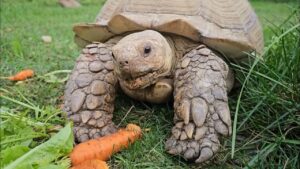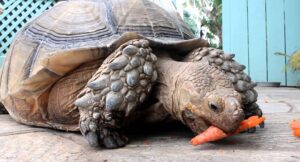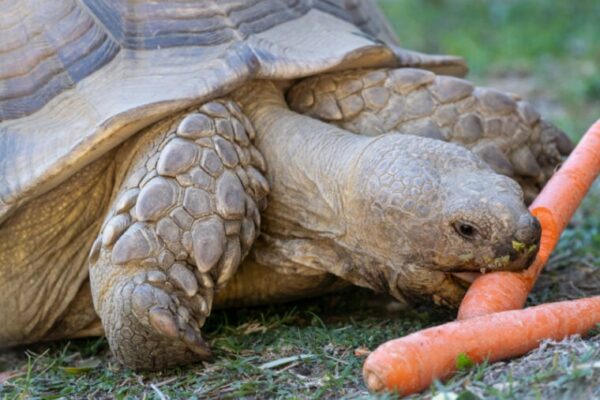Sulcata tortoises, also known as African spurred tortoises, are fascinating reptiles renowned for their longevity and gentle disposition. As conscientious pet owners, ensuring their dietary needs are met is paramount to their health and well-being. Among the plethora of foods available, the question often arises: Can sulcata tortoises eat carrots?
In this guide, we delve into the nutritional requirements of sulcata tortoises and explore whether carrots, a commonly available vegetable, fit into their dietary regimen. Understanding the dietary habits of these magnificent creatures is crucial for providing them with a balanced and enriching diet. Let’s uncover the facts and considerations surrounding the inclusion of carrots in the diet of sulcata tortoises.
Nutritional Needs of Sulcata Tortoises

Sulcata tortoises, like all reptiles, have specific nutritional needs essential for their health and well-being. Understanding these requirements is crucial for providing adequate care for these magnificent creatures. Here are the key nutritional needs of sulcata tortoises:
- High-Fiber Diet: Sulcata tortoises are herbivores, primarily consuming a diet rich in fiber. Their digestive systems are adapted to process fibrous vegetation, such as grasses, weeds, and leafy greens.
- Calcium: Calcium is crucial for the development and maintenance of healthy bones and shell in sulcata tortoises. Insufficient calcium can lead to metabolic bone disease, a severe health condition affecting the tortoise’s skeletal structure.
- Vitamin D3: Vitamin D3 is essential for calcium absorption and utilization in the body. Exposure to natural sunlight or appropriate UVB lighting is necessary for sulcata tortoises to synthesize vitamin D3.
- Moderate Protein: While sulcata tortoises primarily require a plant-based diet, they still need some protein for various bodily functions. However, excessive protein intake can lead to health issues, so it should be provided in moderation.
- Limited Sugars and Starches: Sulcata tortoises should avoid foods high in sugars and starches, as these can disrupt their digestive system and lead to obesity and other health problems.
- Variety: Offering a diverse array of foods ensures that sulcata tortoises receive a wide range of nutrients necessary for their overall health. This includes different types of grasses, weeds, leafy greens, and occasional fruits and vegetables.
- Hydration: Adequate hydration is vital for sulcata tortoises to maintain proper bodily functions. Providing a shallow water dish for drinking and soaking is essential, especially in hot climates or during periods of increased activity.
- Avoid Toxic Plants: Some plants are toxic to sulcata tortoises and should be avoided at all costs. It’s essential to research and ensure that any vegetation offered to them is safe for consumption.
By meeting these nutritional needs through a well-balanced diet and proper husbandry practices, you can help ensure the health and longevity of your sulcata tortoise companion. Consulting with a reptile veterinarian or experienced reptile keeper can provide further guidance on specific dietary requirements and care recommendations for sulcata tortoises.
Can Sulcata Tortoises Eat Carrots?
Sulcata tortoises can indeed eat carrots, but it’s important to provide them in moderation and as part of a balanced diet. Carrots are a good source of various nutrients, including vitamin A, which is essential for the health of sulcata tortoises. However, carrots are also relatively high in sugar and should not be the primary component of their diet.
When feeding carrots to sulcata tortoises, it’s crucial to offer them in small, manageable pieces to prevent choking hazards. Additionally, ensure that the carrots are fresh and free from any pesticides or harmful chemicals.
While carrots can be a healthy occasional treat for sulcata tortoises, they should be complemented with a variety of other vegetables, leafy greens, and occasional fruits to provide a well-rounded diet. Consulting with a veterinarian or reptile specialist can help you create a suitable diet plan tailored to your tortoise’s specific nutritional needs and overall health.
Guidelines for Feeding Carrots to Sulcata Tortoises
Feeding carrots to your sulcata tortoise can be a nutritious addition to their diet when done in moderation and following these guidelines:
- Freshness: Always provide fresh carrots. Avoid giving carrots that are wilted, moldy, or showing signs of decay.
- Preparation: Wash the carrots thoroughly to remove any dirt or pesticides. Peel the carrots to remove the outer layer, which may have been exposed to chemicals.
- Cutting: Cut the carrots into small, bite-sized pieces. This helps prevent choking and makes it easier for your tortoise to consume.
- Moderation: Carrots should be given as an occasional treat and not as a staple food. Too many carrots can lead to an imbalance in their diet due to the relatively high sugar content.
- Variety: Rotate carrots with other vegetables and leafy greens to ensure a diverse diet. Sulcata tortoises require a mix of vegetables, greens, and occasional fruits for optimal nutrition.
- Supplementation: While carrots provide some nutrients like vitamin A, they should be supplemented with calcium and other essential vitamins and minerals. Consider dusting the carrots with a reptile calcium supplement before feeding.
- Observation: Monitor your tortoise’s response to carrots. If they show any signs of digestive upset or if their stools become loose, reduce the amount or frequency of carrot consumption.
- Consultation: If you’re unsure about incorporating carrots into your sulcata tortoise’s diet, consult with a veterinarian or reptile specialist. They can provide tailored advice based on your tortoise’s individual needs and health status.
By following these guidelines, you can safely offer carrots to your sulcata tortoise as part of a varied and balanced diet, promoting their overall health and well-being.
Factors to consider before feeding carrots to sulcata tortoises

Before feeding carrots to your sulcata tortoise, consider the following factors to ensure their health and well-being:
- Age and Size: Younger sulcata tortoises may have different dietary requirements compared to adults. Adjust the portion size and frequency of carrot consumption accordingly. Additionally, larger tortoises may tolerate carrots better than smaller ones.
- Overall Diet: Carrots should be a part of a diverse diet for sulcata tortoises. Consider their entire diet, including leafy greens, vegetables, and occasional fruits, to ensure they receive balanced nutrition.
- Nutritional Content: While carrots offer essential nutrients like vitamin A, they also contain sugars. Moderation is key to prevent imbalances in their diet and avoid potential health issues such as obesity or digestive problems.
- Frequency: Carrots should be given as an occasional treat rather than a daily staple. Overfeeding carrots can lead to nutrient imbalances and digestive issues.
- Preparation: Ensure the carrots are fresh, washed thoroughly, and free from pesticides or chemicals. Remove the outer layer by peeling to minimize exposure to any potential contaminants.
- Size and Texture: Cut carrots into small, manageable pieces to prevent choking hazards. Tortoises may have difficulty consuming large or hard pieces of carrot.
- Supplementation: While carrots provide some nutrients, they should be supplemented with calcium and other essential vitamins and minerals. Consider dusting the carrots with a reptile calcium supplement before feeding.
- Observation: Monitor your tortoise’s response to carrots. If they exhibit any signs of digestive upset or if their stools become abnormal, reduce the amount or frequency of carrot consumption.
- Consultation: If you’re uncertain about feeding carrots to your sulcata tortoise or if they have specific dietary needs or health concerns, consult with a veterinarian or reptile specialist for guidance.
By considering these factors, you can safely incorporate carrots into your sulcata tortoise’s diet as part of a balanced and nutritious meal plan.
Monitoring the tortoise’s response to carrot consumption
Monitoring your sulcata tortoise’s response to carrot consumption is essential to ensure their health and well-being. Here are some aspects to observe:
- Digestive Health: Pay attention to your tortoise’s digestion after consuming carrots. Look for any signs of diarrhea, constipation, or abnormal stools, which could indicate digestive upset.
- Appetite: Monitor your tortoise’s appetite. A sudden decrease in appetite or refusal to eat may indicate that the carrots are causing discomfort or digestive issues.
- Activity Level: Observe your tortoise’s activity level. A decrease in activity or lethargy after consuming carrots could be a sign of discomfort or digestive problems.
- Weight: Regularly weigh your tortoise to track any changes in weight. Sudden weight loss or gain could be a sign of dietary imbalances or health issues related to carrot consumption.
- Shell Health: Check the condition of your tortoise’s shell regularly. A healthy diet, including carrots in moderation, contributes to strong shell growth. Any abnormalities or soft spots on the shell could indicate nutritional deficiencies or health problems.
- Overall Appearance: Assess your tortoise’s overall appearance for any changes. Look for signs of dehydration, such as sunken eyes or dry skin, which could be exacerbated by excessive carrot consumption.
- Behavioral Changes: Pay attention to any changes in your tortoise’s behavior. Agitation, restlessness, or unusual movements may indicate discomfort or digestive issues.
- Consultation: If you notice any concerning symptoms or changes in your tortoise’s behavior or health, consult with a veterinarian or reptile specialist promptly. They can provide guidance and recommendations based on your tortoise’s specific needs and circumstances.
By closely monitoring your sulcata tortoise’s response to carrot consumption, you can ensure that they are receiving a balanced diet and address any potential health issues promptly.
Conclusion
Can sulcata tortoises eat carrots? Yes, they can, but it’s essential to offer them in moderation and as part of a varied diet. Carrots provide valuable nutrients but should be complemented with other vegetables and greens.
By adhering to proper feeding guidelines, monitoring their response, and ensuring a balanced diet, you can safely incorporate carrots into your sulcata tortoise’s meals, promoting their overall health and vitality.

